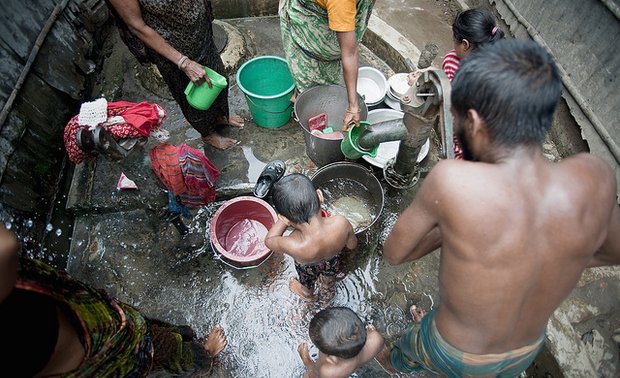Poor sanitation has a direct effect on maternal health. In a previous article, I wrote about the best and worst places to be a mother based off of the annual State of the World’s Mothers report by Save the Children, and sanitation proved to be a significant factor in why some countries were ranked so low. The findings showed that there is a significant disadvantage for mothers living in an urban environment, specifically within urban slums.
Slums are known for overcrowding, dilapidated housing, and lack of safe water sources. Another common feature of urban slums is a lack of improved sanitation.
Water and sanitation are so important when it comes to providing basic health needs for people. It makes poor mothers and children even more susceptible to disease. Health is obviously a primary concern for pregnant women and newborn children. But when they don’t have access to proper sanitation, crowded situations such as slum-living, create a higher risk for contagion for any infectious disease.
Water-borne illnesses, directly linked to poor sanitation, lead to malnutrition in mothers. This is then passed on to the children, and leads to higher than normal death rates.
Open defecation is also very common in slum lifestyles. For instance, the West Point shantytown of Monrovia is home to 40,000 people. This slum only has five public toilets for all of those people to use. This means hygiene is near impossible to keep up and open defecation is a necessity. This part of Liberia sees about 20 inches of rainfall each month during it’s wet season, which leads to a sanitation disaster. The rain mixes with the feces and the contaminated water flows through the streets and combines with a lot of the wells that are used for water supply. Cholera and severe diarrhea are just a couple of the dangerous diseases that spread this way and affect pregnant mothers and newborns in this environment.

Maternal, newborn, and child health are directly affected by sanitation situations. This is one of the many reasons why improved sanitation needs to be priority among the Sustainable Development Goals (SDGs) with ambitious targets for countries to strive towards. If sanitation is a priority, countless mothers’ lives as well as their children’s lives can be saved and improved.
Because of the direct effects sanitation can have on women, the Women for Water & Sanitation Declaration has been formed to call on world leaders to commit politically and financially to increasing sustainable access to clean water, hygiene, and sanitation. An impressive list of women have signed on to the declaration including the First Ladies of Malawi and Madagascar, actresses Bonnie Wright, Rachel Brosnahan, and Freida Pinto, and the Prime Ministers of Norway and Denmark.
But we’re also asking ALL global citizens to sign on (not just women!) to the declaration to help push it forward. So go to TAKE ACTION NOW and add your name to the list so that everywhere is a good place to be a mother and have a baby. Don’t let poor sanitation be a reason for maternal health to be compromised.